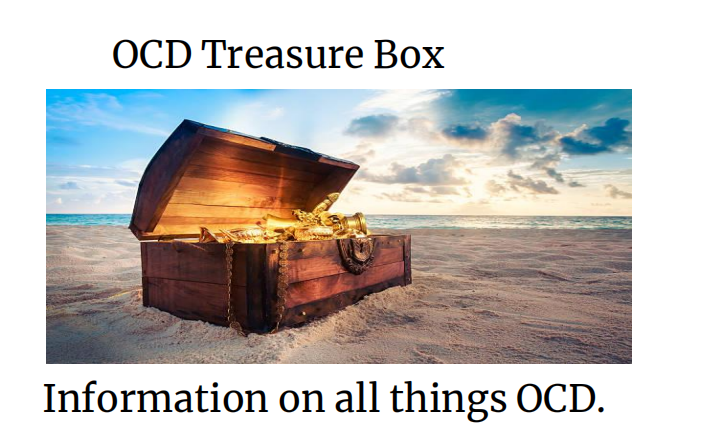On this website, we have talked about the treatments for OCD. These included:-
Exposure Response Prevention Therapy, (ERP), which empowers the individual to face their fears/obsessions and then resist carrying out compulsions to neutralise the obsessions.
Medication in the form of Selective Serotonin Reuptake Inhibitors, (SSRI's) can also help reduce symptoms of OCD by increasing the levels of serotonin in the brain. Anti anxiety medications can also help relieve symptoms too.
Sometimes a combination of ERP and Medication will be implemented.
Please note:-
(I am not a doctor - therefore please always seek professional advice and support from your GP about therapy and medication for OCD).
As-well as ERP and Medication there are many other things that can help to improve symptoms of OCD. Examples of these are as follows:-
1. Help and support from family and friends.
2. Joining a support Group.
3. On-line support/information via chat rooms, email or blogs.
4. Telephone Helplines.
5. Other talk therapies.
6. There are a large selection of good books on the subject of OCD.
7. Daily meditation.
8. Self-help in the form of exercising, getting enough sleep, eating a good healthy nutritional diet and getting more involved in hobbies or favourite passtimes.
Help and support from family and friends
It is important to remember that it is not only the person who has OCD who is effected but that family, friends and carers also share in the difficulties and challenges that OCD can cause. It is therefore important that everyone involved has some knowledge of what OCD is and the effect that it can have on all those who offer care and support. Often it is difficult for those of us who have OCD to understand why we respond to obsessions by doing endless compulsions. Therefore, if it is difficult for us to understand it is going to be much more difficult for our family and friends to understand too. Patience with each other is therefore extremely important as everyone learns to navigate these difficulties together.
Joining a local support group or an on-line support group
Support groups whether face-to-face or on-line can be extremely helpful for anyone who has OCD or who cares for someone who has OCD. Over the years I have been to a number of OCD support groups and on each occasion they have helped to break down the isolation that OCD can create. For me, it brought great relief because I then realised that I was not the only one who was suffering in this way. It made me even more determined to face it knowing that others were doing the same.
Sometimes people with OCD can find it daunting to attend a face-to-face support group. Just getting to the group can be a huge obstacle. On-line support groups can therefore offer another alternative to a person who has OCD, where they don't even have to leave their home. Since the coronavirus pandemic on-line support groups and other on-line support has become more readily available. Therefore, no-one should ever feel alone when living with or caring for someone who has OCD.
On-line support/information
Living in a greater technological world has meant that there is a lot more help and support available on-line about OCD. This may come through websites, email support, chat rooms and blogs, to name just a few. Whereas years ago help and support really only came from visiting the GP or specialist face-to-face, support is now much more readily available on-line and without leaving home. In particular, Exposure Response Prevention Therapy (ERP) can be accessed through social network platforms such as 'Zoom.'
Telephone Helplines
In the UK telephone helplines can also offer much needed help and support for OCD. These include:-
OCD Action - Call 0300 636 5478 (Help and information line), or 0207 2535272
OCD UK - Call 01332 588112 (between 9am-12pm Mon-Fri)
The Mental Health Foundation (MHF) - Call 020 7803 1100
Mind - Call 0300 123 3393 (Information line)
Other Talk Therapies
ERP is recognised as the 'Gold Standard' treatment for OCD but sometimes ERP is not always available straight away. In this case Person Centred Therapy can be very beneficial in 'holding' the client until ERP is available. Often just before diagnosis and early after, a person may feel that they are the only one experiencing such thoughts and compulsions. They may feel that they are going mad. Person Centred Counselling can therefore offer the space and opportunity for the person to talk about their concerns without being judged. It can help reassure them that they aren't going mad.
Books on OCD
There are many books available on the subject of OCD. A few of these are listed below:-
1. Overcoming Obsessive Compulsive Disorder (A self-help guide using Cognitive Behavioural Techniques) - By David Veale and Rob Willson. (21 April 2009)
2. Brain Lock, Twentieth Anniversary Edition: Free Yourself from Obsessive-Compulsive Behaviour - By Jeffrey M. Schwartz, MD with Beverly Beyette. (3 Nov 2016)
3. The OCD Answer Book: Professional answers to more than 250 top questions about Obsessive Compulsive Disorder - by Patrick McGrath. (1 Dec 2007)
Daily Meditation
For some people mindfulness meditation for at least 10 minutes a day can help to calm the mind and bring some relief from the very distressing thoughts of OCD. It is also best if the meditation is done at the same time each day. However, it should be noted that meditation alone should not replace ERP and/or medication (SSRI's); rather it could be used alongside these to further help someone in their rcovery from OCD. It should also be noted that mindfulness meditation may work well for some but not so well for others.
